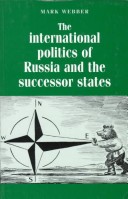Regional International Politics
1 total work
The International Politics of Russia and the Successor States
by Mark Webber
Published 8 February 1996
This textbook examines the external relations of the 15 new states which emerged from the Soviet Union in 1991. Mark Webber examines the consequences of the Soviet collapse for the system of international relations within Eastern Europe and Central Asia. The author explores both the relations between the states themselves and between the states and the wider world. He pinpoints the daunting challenges facing the new states: the invention of foreign policy orientations; the management of the Red Army's material legacy, including nuclear weapons; the resolution of regional conflicts; and the need for economic revival. Two key themes emerge: the reassertation of national identities, and the special position of Russia, which has assumed to some extent the rights and the obligations of the Soviet Union on the world stage whilst having to tackle the chaos of local wars and internal economic collapse.
